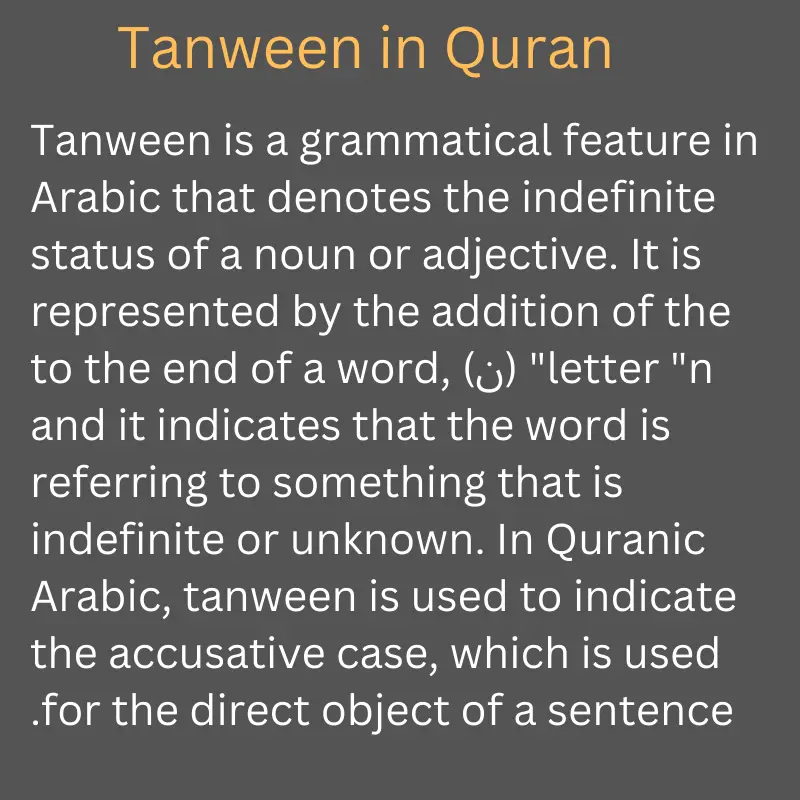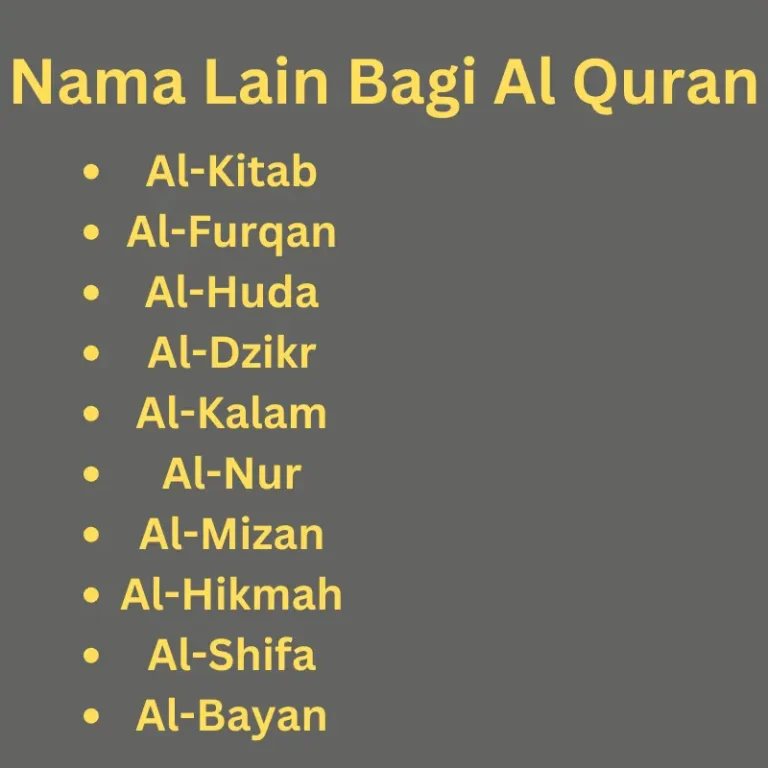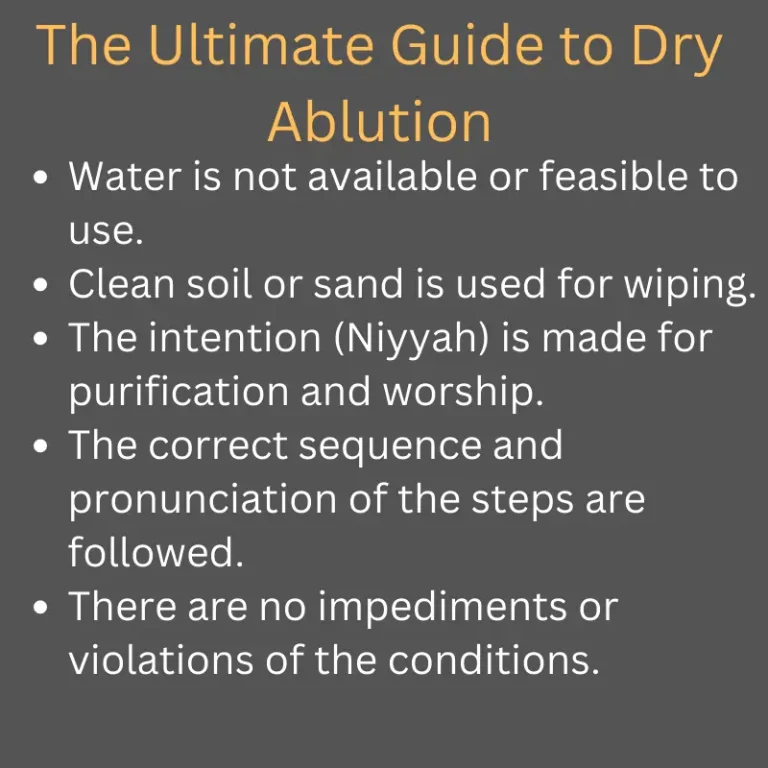The Quran, the holy book of Islam, is filled with linguistic features that add to its poetic beauty and depth of meaning. One such feature is tanween, also known as nunation, which refers to the addition of an “n” sound at the end of a word.
What is Tanween?
Tanween is a grammatical feature in Arabic that denotes the indefinite status of a noun or adjective. It is represented by the addition of the letter “n” (ن) to the end of a word, and it indicates that the word is referring to something that is indefinite or unknown. In Quranic Arabic, tanween is used to indicate the accusative case, which is used for the direct object of a sentence.
The Different Types of Tanween
There are three types of tanween in Quranic Arabic:
Fatḥah Tanween
This type of tanween is represented by two short vowel marks, known as fatha, on the last letter of a word. It is used to indicate the indefinite accusative case.
Kasrah Tanween
This type of tanween is represented by two short vowel marks, known as kasrah, on the last letter of a word. It is used to indicate the indefinite genitive case.
Dammah Tanween
This type of tanween is represented by two short vowel marks, known as ḍammah, on the last letter of a word. It is used to indicate the indefinite nominative case.
The Significance of Tanween in Quran
The use of tanween in Quranic Arabic is significant for several reasons. Firstly, it adds to the poetic beauty of the Quran by giving it a rhythmic flow. The addition of the “n” sound at the end of a word creates a melody that is unique to Quranic recitation.
Secondly, tanween is used to indicate the grammatical case of a word in a sentence, which is important for understanding the meaning of a verse. For example, the use of fatḥah tanween in the verse “إِلَىٰ رَبِّهَا نَاظِرَةً” (Surah An-Naziat, 79:14) indicates that the word “رَبِّهَا” is the direct object of the verb “نَاظِرَةً”, which means “looking up to her Lord”.
Applications of Tanween in Quran
Tanween is used in Quran in various ways, including:
- Indefinite Nouns: Tanween is used to indicate an indefinite noun, such as in the verse “فَأَرَادَ فِيهَا خَيْرًا فَفَتَحْنَا عَلَيْهِ وَبَرَكْنَا لَهُ فِيهَا” (Surah Al-Qasas, 28:82), which means “So he intended to do good to her and we caused him to fall in love with her and a sense of contentment and peace was placed between them.”
- Adjectives: Tanween is also used to indicate an indefinite adjective, such as in the verse “وَأَقِيمُوا الصَّلَاةَ وَآتُوا الزَّكَاةَ (Surah Al-Baqarah, 2:43), which means “And establish prayer and give zakat.”
- Idaafah: Tanween is used in idaafah, which is a grammatical construction in Arabic that expresses possession or relationship between two nouns. For example, in the verse “مِنْ شَرِّ الْوَسْوَاسِ الْخَنَّاسِ” (Surah Al-Nas, 114:4), the word “الْخَنَّاسِ” is in the accusative case and has fatḥah tanween, indicating that it is the object of the noun “الْوَسْوَاسِ”.
- Iltifat: Tanween is also used in iltifat, which is a rhetorical device in Arabic that involves shifting the grammatical structure of a sentence to add emphasis or change the direction of the meaning. For example, in the verse “فَلِلَّهِ الْحَمْدُ رَبِّ السَّمَاوَاتِ وَرَبِّ الْأَرْضِ رَبِّ الْعَالَمِينَ” (Surah Al-Fatiha, 1:2-4), the first two phrases have kasrah tanween, indicating that they are in the genitive case and are possessed by the word “الْحَمْدُ”. This creates a rhetorical effect that emphasizes the oneness of Allah and his lordship over all things.
Tanween is a significant feature of Quranic Arabic that adds to the poetic beauty and depth of meaning of the Quran. It is used to indicate the grammatical case of a word in a sentence, and is employed in various ways in Quranic discourse. Understanding the significance and applications of tanween can help deepen our appreciation of the linguistic beauty of the Quran.
What is the difference between tanween and tashkeel?
Tanween refers specifically to the addition of the “n” sound at the end of a word, while tashkeel refers to the use of diacritical marks to indicate the vowels and consonants in Arabic.
Why is Quranic recitation so important in Islam?
Quranic recitation is important in Islam because it is believed to be a means of connecting with Allah and receiving divine guidance. It is also considered a form of worship in itself.
What is the significance of iltifat in Quranic Arabic?
Iltifat is a rhetorical device in Arabic that adds emphasis and variation to the structure of a sentence. In Quranic Arabic, it is used to create a poetic and rhetorical effect that enhances the beauty and depth of meaning of the Quran.
What is idaafah in Arabic grammar?
Idaafah is a grammatical construction in Arabic that expresses possession or relationship between two nouns. It is commonly used in Arabic poetry and is an important feature of Quranic Arabic.
What is the best way to learn Quranic Arabic?
The best way to learn Quranic Arabic is through a combination of formal study and practice. Taking classes with a qualified teacher, reading and memorizing Quranic passages, and practicing recitation are all effective ways to learn Quranic Arabic.
What is the purpose of Tanween in the Quran?
Tanween serves a grammatical function in the Quran by indicating the indefinite status of a noun. It helps clarify the intended meaning and interpretation of certain verses.
How is Tanween applied in the Quran?
Tanween is applied to the end of specific words in the Quran, appearing in the form of three short vowels: -an, -in, and -un. These diacritical marks signal the absence of definiteness and influence the grammatical structure of the text.
What role does Tanween play in understanding Quranic verses?
By indicating the indefinite status of nouns, Tanween helps determine whether a noun is indefinite or definite in meaning. This grammatical feature contributes to the accurate understanding and interpretation of the Quranic text.
Are there specific rules or patterns for the application of Tanween in the Quran?
Yes, there are rules and patterns that govern the application of Tanween in the Quran. These rules are part of Arabic grammar and are essential for studying the language and comprehending the intricacies of Quranic verses.
Can the absence or presence of Tanween change the meaning of a Quranic verse?
Yes, the presence or absence of Tanween can impact the meaning of a Quranic verse. By indicating the indefinite status of a noun, Tanween can alter the interpretation and understanding of a verse, highlighting nuances and linguistic nuances within the text.








